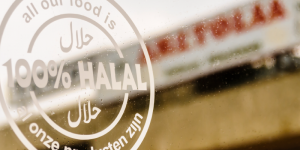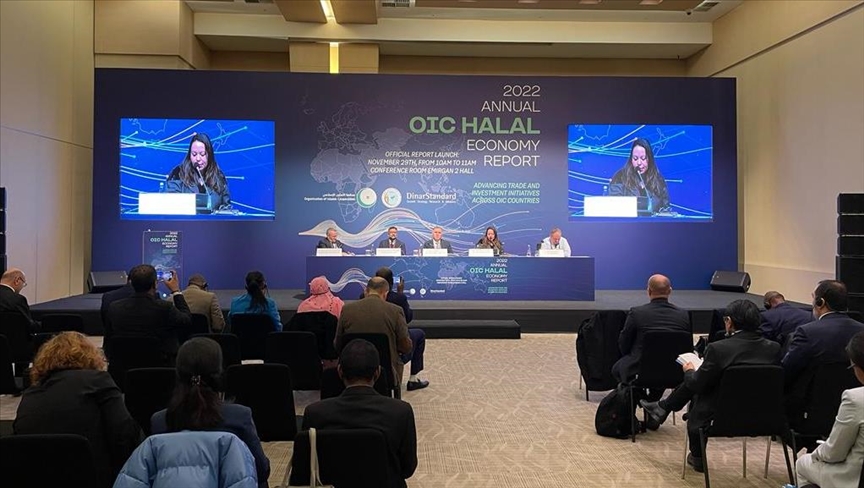Halal Food Economy
Maria Hussain
29th August 2008
Because clean water is a requirement of Islamic life, the early
Muslims took it as a duty as fard upon themselves to build huge
aqueducts that provided clean water to the people. In the same way,
Muslims today have an obligation to rework their supply network for
zabiha meat so that they can truly guarantee to the people that it
is halal and does not contain questionable by-products.
The American corporate infrastructure is neither adequate nor
responsible to ensure its citizens are fed in accordance with
Islamic guidelines. U.S. laws allow pork protein to be fed to cows,
and chicken meat to be fed to chickens. Fifteen percent of licensed
feed mills and thirty percent of unlicensed feed mills do not comply
with U.S. sterilization laws. The demand for natural/organic meat
increases every year, with growing consumer education and alarm. A
CNN poll in March 2001 showed that two-thirds of Americans are
concerned about mad cow disease becoming a problem in this country.
Rasulallah (peace be upon him) prohibited eating the animal that
feeds on filth and drinking its milk (Abu Dawud). We must
restructure our food economy to comply with the requirements of our
religion in all its practical aspects, not merely the rituals, but
to meet the common, collective needs of the people. This is not
impossible, and it has to be done now.
Resolving This Crisis According to Soundvision.com’s report, “It May
Be Zabiha, But Is It Halal?” Dr. Ahmad Sakr suggests the only viable
solution to the unavailability of genuinely halal meat products and
pure foods is to establish farms that are run by Muslims who will
raise livestock on plant-based feed that contains no hormones,
preservatives, meat, blood, or any animal by-products whatsoever.
I can think of a far more efficient way to feed the Muslims than
waiting for the sons of today’s engineers and taxi drivers to grow
up and become farmers. Among the People of the Book are American
farmers who are still committed to maintaining ethical farming
standards. Because of this, they are struggling to survive. We need
to identify them and enter into mutually beneficial business
agreements with them.
Creating Muslim-Driven Supply and Demand
Relying on mainstream food suppliers, it is nearly impossible to get
organic meat in the U.S., zabiha or not. The present system of
industrial food processing requires a supplier to provide thousands
of heads of cattle at a time to fill the demand of American
supermarkets. Organic farmers find it difficult to gain a foothold
in the consumer market because it is impossible for small farms to
meet that type of demand. Although organic meat is not yet available
on the retail market, concerned persons who are determined to eat
all-natural have the option of forming co-ops. Co-operatives were
launched in this country 150 years ago.
This is how coops work. People pool their money together to buy in
bulk and save. A few families may split the price of a cow, lamb or
sheep. You can find thousands of organic and grass-fed livestock
farms on the Internet. Most farmers will let you use their farm to
make the zabiha. They might also process and cut up the meat after
you have slaughtered it Islamically. On average, one cow makes six
hundred pounds of packaged beef. Thus, even if you had to drive some
distance, hire a Muslim butcher, and then truck the meat back home,
it could still be worth the cost. When enough people start bypassing
the distributor and getting their meat directly from the farmer, the
meat stores will start noticing they are losing business and
eventually they will be forced to start offering organic meat.
Mainstreaming a Muslim-Managed Industry
While forming coops are one possible solution to this vexing
problem, I have even higher hopes for a voluntary upgrade of the
entire halal meat industry to halal and tayyab, before consumers are
forced to boycott halal meat vendors. Smart businessmen are always
interested in new ways to generate profits, and I sincerely hope
they will jump at this opportunity to get a corner on the organic
meat market before some non-Muslim conglomerate caters to the
demand. The only thing that can make it happen is community
education. As soon as rank-and-file Muslims realize their “halal”
meat is not genuinely halal, they will not be able to eat it and
will demand a change.
The Muslim business community would be uniquely suited for bring?
ing quality organic meat to the population centers of the U.S. No
one else could do it as efficiently, as we already have an organized
distribution network of small halal meat stores throughout America.
It would not be that hard to switch suppliers to a traceable source
of cattle, free of preservatives, pesticides, animal feed by-
products, drugs and hormones. If the slaughterhouses saw the
advantage of buying, livestock only from organic certified farms, from
today the organic farmers would commit to servicing the halal meat
industry, and with minimal bureaucratic red tape.
Islamic meat companies are not huge corporations. Our meat industry
is decentralized, meaning one halal grocery store could, in theory, buy
from a couple nearby grass-fed cattle farmers, rather than having to go
through a distributor. A larger meat distributor could contract with a
farm collective for his supply.
Family-owned farms already have a system in place where organic
farms pool their cattle to meet consumer demand. These collectives
will provide a steady supply of cattle for our smaller commercial
needs. Presently, an organic farm collective could probably supply
only ten head of cattle a day, but if the farmers got a sincere
commitment from the Muslims, they would be more than happy to
increase their output to feed all eight million of us.
Gary DeMoe, a Wisconsin cattle rancher I contacted, told me, “A
large and sustained market such as you are suggesting would get my
attention and favor, which means I would bend every possible effort
to supply it. Business is business.”
If all the Muslim consumers switched over to halal and tayyab
zabiha, the organic farmers would get the commercial base they need
to really start producing. The industry could go from one percent to
fifteen percent of the entire food industry virtually overnight. We
are talking about tens of billions of dollars potentially generated
by a collaborative effort between the Muslim community and the
organic farmers of America. It would be a huge blessing for the
entire economy, as well as the environment. I believe that Allah
will give us this advantage and more, if only we would start doing
things His way.
Establishing high-quality standards for halal meat should not just
be the dream of some fringe group of health food freaks and
religious fanatics. Grass-fed cows and sheep, and organic chickens
should be the standard of the halal industry. When Allah’s name
becomes associated with purity and ethical business practices, the
Muslims’ tarnished reputation will be restored. Many people, includ
ing non-Muslims, will frequent our halal stores if the meat is
safer, tastier and healthier than what is available at the retail
supermarket. Some will drive long distances to buy organic meat.
Zabiha butchers and distributors should take courage and accept this
challenge, for Allah will make it easy for them.



